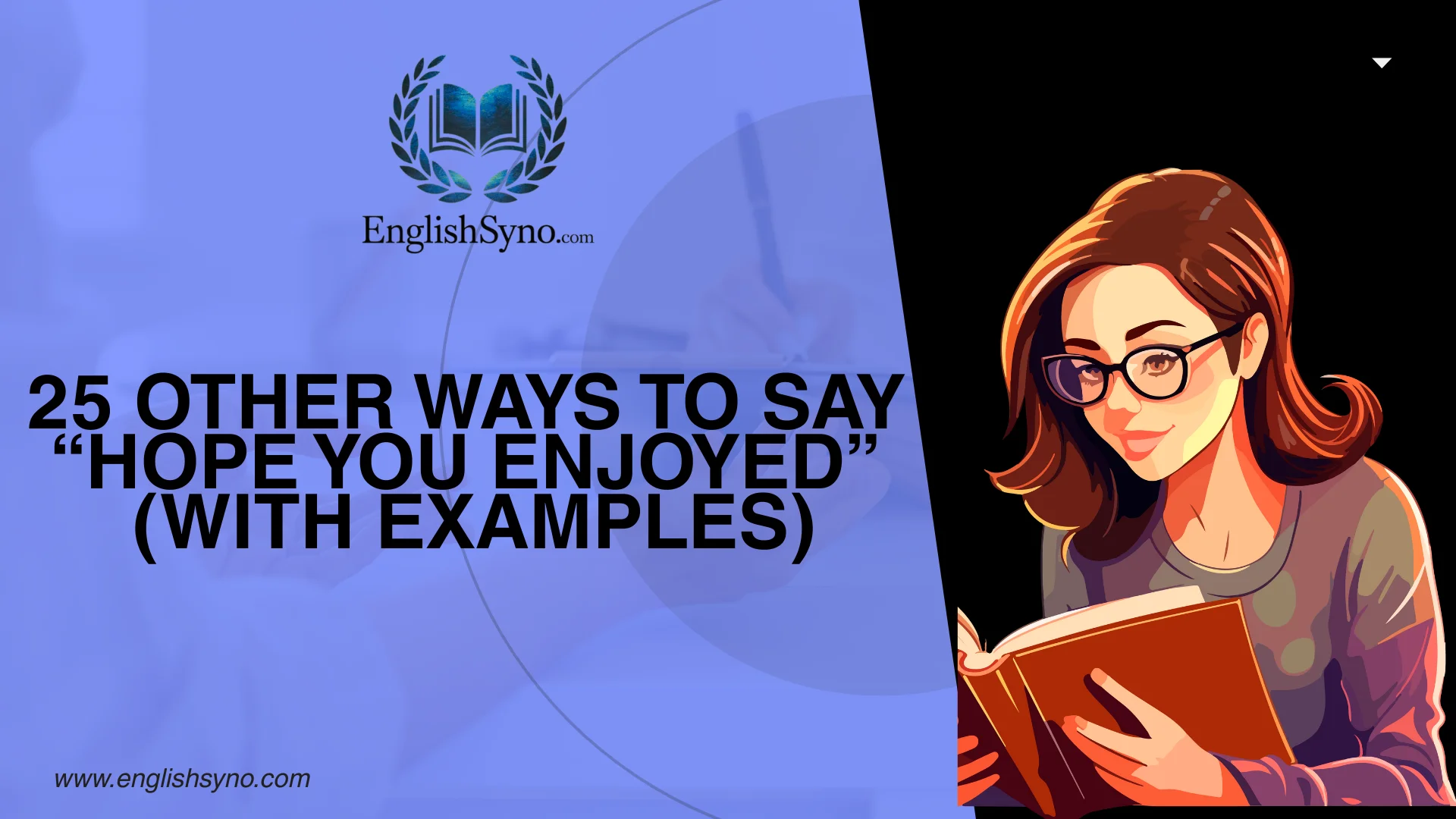The phrase hope you enjoyed often shows a personal connection, and I like to express it warmly and naturally. The verb “enjoy” is transitive, always requiring an object, so it should be paired with something like your meal, day, etc. In this structure, the meaning stays correct, the phrase feels complete, and every detail adds clarity when I write it or say it aloud to someone.
In my own conversations, I’ve noticed the simple past tense “enjoyed” is usually used when the event is over, focusing on what actually happened at that time. After a gathering, I often say, “I hope you enjoyed it,” while reflecting on the place or experience. I’ve always appreciated how this makes conversation feel easy, complete, and still in the moment, striking the right balance of accuracy and friendliness.
What Does “Hope You Enjoyed” Mean?
The phrase ‘I hope you enjoyed’ is a way to show consideration after someone has experienced something, such as an event, meal, or activity. It expresses kindness, suggesting you care about how the other person feels. The verb enjoy is transitive, meaning it needs an object (“it,” “your day,” “the meal,” etc.), making the sentence complete.
When to Use Hope You Enjoyed
I hope you enjoyed it after an occasion or experience has ended. It is best when you want to show thoughtfulness and politeness. You can use it in casual chats with friends or in professional emails when thanking someone for attending an event or meeting.
Is It Professional/Polite to Say Hope You Enjoyed?
Yes, hope you enjoyed it, it is both professional and polite, depending on the tone and context. It works well in business emails (“I hope you enjoyed the presentation”) and in personal settings (“I hope you enjoyed your weekend”). However, to sound more personal, you may want to expand the phrase, such as “I hope you enjoyed your time with us.”
Pros or Cons
Pros: Warm, simple, empathetic, professional, polite, versatile.
Cons: Can sound generic if repeated often, incomplete without an object, and may feel too short in formal writing.
I hope you had a great time
Meaning/Definition: Expresses that you want the person’s experience to have been enjoyable and positive.
Detailed Explanation: This alternative adds energy and warmth, making it sound more personal than just “hope you enjoyed.”
Email Example:
“Hi Sarah, thank you for attending our event last night. I hope you had a great time connecting with others and learning from the speakers.”
Best Use: Social events, casual gatherings, friendly follow-ups.
Worst Use: Serious or professional settings where tone should remain formal.
Tone: Warm, light, personal.
I trust you enjoyed yourself
Meaning/Definition: A more formal variation that conveys confidence in the person’s positive experience.
Detailed Explanation: By using “trust,” it shows assurance and respect, often in professional or semi-formal settings.
Email Example:
“Dear Mr. Lee, I trust you enjoyed yourself at the annual company retreat. It was a pleasure hosting you.”
Best Use: Formal emails, business gatherings, polite acknowledgments.
Worst Use: Informal chats, casual texts to close friends.
Tone: Professional, polite, respectful.
I hope everything met your expectations
Meaning/Definition: Indicates that you cared about the person’s standards and want reassurance that they were satisfied.
Detailed Explanation: This phrase feels service-oriented, great for situations where quality or experience is expected.
Email Example:
“Hello James, thank you for staying with us. I hope everything met your expectations during your visit.”
Best Use: Hotels, restaurants, customer service emails.
Worst Use: Very casual settings.
Tone: Professional, thoughtful, polite.
I hope it was worth your time
Meaning/Definition: Acknowledges the person’s time as valuable and shows respect for it.
Detailed Explanation: This variation is excellent in business settings, showing that you value their commitment.
Email Example:
“Hi Emma, thank you for attending the webinar. I hope it was worth your time and gave you useful insights.”
Best Use: Professional meetings, workshops, training.
Worst Use: Casual hangouts with friends.
Tone: Professional, respectful, appreciative.
I hope it brought you joy
Meaning/Definition: Centers on emotions, suggesting you wanted the person to feel happy or uplifted.
Detailed Explanation: This alternative sounds caring and more empathic, ideal for personal notes or supportive messages.
Email Example:
“Dear Anna, it was lovely seeing you yesterday. I hope it brought you joy to reconnect and share memories.”
Best Use: Family, friends, personal conversations.
Worst Use: Business-related communications.
Tone: Warm, emotional, caring.
I hope you liked it
Meaning/Definition: A very simple and casual version that shows you care if someone had a positive reaction.
Detailed Explanation: Often used for small gestures like sharing food, gifts, or creative work.
Email Example:
“Hey Jake, I just wanted to share my new article with you. I hope you liked it and found it interesting.”
Best Use: Informal chats, sharing personal work.
Worst Use: Formal emails or client-facing communication.
Tone: Casual, friendly.
I trust it was enjoyable
Meaning/Definition: A polished version that implies you believe the person’s experience was pleasant.
Detailed Explanation: Works well when you want to keep professionalism but still show kindness.
Email Example:
“Dear Mrs. Parker, thank you for attending the seminar. I trust it was enjoyable and beneficial to your work.”
Best Use: Professional emails, events.
Worst Use: Very casual chats.
Tone: Formal, polite.
I hope you had fun
Meaning/Definition: A lighthearted phrase that conveys playfulness and joy.
Detailed Explanation: Perfect for casual settings where the goal is to make sure the person enjoyed themselves.
Email Example:
“Hey Sam, I hope you had fun at the birthday party! It was so good to see you dancing all night.”
Best Use: Friends, family, casual notes.
Worst Use: Business or professional contexts.
Tone: Playful, warm.
I hope it lived up to your expectations
Meaning/Definition: Acknowledges that the person may have had standards before the event, and you care if they were met.
Detailed Explanation: Strong in customer service or business settings.
Email Example:
“Hello Ms. Rivera, thank you for choosing our restaurant. I hope it lived up to your expectations and you enjoyed the evening.”
Best Use: Service industries, client-facing messages.
Worst Use: Everyday personal interactions.
Tone: Professional, courteous.
I hope you had a pleasant experience
Meaning/Definition: Polite and formal, emphasizing that the person’s experience was comfortable and enjoyable.
Detailed Explanation: Great for situations where professional courtesy is key.
Email Example:
“Dear Michael, I hope you had a pleasant experience during your recent stay with us.”
Best Use: Hotels, travel, customer feedback.
Worst Use: Personal, casual notes.
Tone: Formal, polite.
I hope it brightened your day
Meaning/Definition: Suggests that the experience or gesture brought some positivity.
Detailed Explanation: Warm and uplifting, often used for gifts or messages.
Email Example:
“Hi Ella, just sending over some flowers to say thanks. I hope it brightened your day!”
Best Use: Gifts, surprises, kind gestures.
Worst Use: Business or formal tone.
Tone: Warm, caring.
I hope you found it enjoyable
Meaning/Definition: A slightly formal twist that still conveys thoughtfulness.
Detailed Explanation: Works well in both professional and semi-formal messages.
Email Example:
“Dear Alan, thank you for reviewing the new course. I hope you found it enjoyable and informative.”
Best Use: Courses, presentations, workshops.
Worst Use: Casual text messages.
Tone: Professional, friendly.
I hope it made you happy
Meaning/Definition: Focuses directly on the person’s happiness.
Detailed Explanation: This is personal and affectionate, showing you care about their feelings.
Email Example:
“Hi Mom, I sent you some photos of the kids. I hope it made you happy to see them smiling.”
Best Use: Family, close friends.
Worst Use: Formal or professional communication.
Tone: Warm, emotional.
I hope it was a good experience for you
Meaning/Definition: Emphasizes the overall quality of the event.
Detailed Explanation: Balanced between polite and casual, making it very versatile.
Email Example:
“Dear Laura, I hope it was a good experience for you attending the workshop.”
Best Use: Events, workshops, professional exchanges.
Worst Use: Quick chats with friends.
Tone: Polite, considerate.
I hope you had a memorable time
Meaning/Definition: Suggests that the person’s experience should be something worth remembering.
Detailed Explanation: Best when you want to emphasize lasting impact.
Email Example:
“Dear John, I hope you had a memorable time at the gala. We enjoyed hosting you.”
Best Use: Special events, ceremonies.
Worst Use: Very casual gatherings.
Tone: Warm, slightly formal.
I hope you enjoyed yourself
Meaning/Definition: A direct yet polite way to confirm someone’s satisfaction.
Detailed Explanation: This is the closest alternative to the original phrase, but slightly more complete.
Email Example:
“Dear Chloe, I hope you enjoyed yourself at the company picnic.”
Best Use: Semi-formal and casual events.
Worst Use: High-level formal writing.
Tone: Warm, polite.
I hope it was delightful
Meaning/Definition: Adds elegance and charm by emphasizing delight.
Detailed Explanation: Great for writing where you want to sound extra thoughtful.
Email Example:
“Dear Claire, I hope it was delightful to explore the art exhibition yesterday.”
Best Use: Art, food, cultural experiences.
Worst Use: Day-to-day casual chats.
Tone: Elegant, refined.
I hope you felt comfortable
Meaning/Definition: Shifts focus to comfort, showing care for someone’s well-being.
Detailed Explanation: Useful in hospitality or hosting contexts.
Email Example:
“Dear Guest, thank you for staying with us. I hope you felt comfortable during your visit.”
Best Use: Hotels, home visits, client hosting.
Worst Use: Informal chats.
Tone: Professional, caring.
I hope it was enjoyable for you
Meaning/Definition: Keeps the tone neutral but still conveys kindness.
Detailed Explanation: This phrasing works when you don’t want to assume too much.
Email Example:
“Dear Alex, I hope it was enjoyable for you to attend our training session.”
Best Use: Professional settings.
Worst Use: Casual, short texts.
Tone: Neutral, polite.
I hope you had a positive experience
Meaning/Definition: Highlights the positivity of the event.
Detailed Explanation: Often used in feedback-related contexts.
Email Example:
“Hi Taylor, thank you for using our services. I hope you had a positive experience.”
Best Use: Customer feedback, service follow-ups.
Worst Use: Personal chats.
Tone: Professional, considerate.
I hope you enjoyed the moment
Meaning/Definition: Centers on the present experience.
Detailed Explanation: Great for reflecting on special occasions.
Email Example:
“Hi Ben, it was great celebrating with you. I hope you enjoyed the moment as much as we did.”
Best Use: Weddings, birthdays, celebrations.
Worst Use: Very professional or formal contexts.
Tone: Warm, reflective.
I hope you appreciated it
Meaning/Definition: Focuses on whether the gesture was valued.
Detailed Explanation: Can be formal or informal depending on tone.
Email Example:
“Hi Zoe, I hope you appreciated it when we included your feedback in the project.”
Best Use: Work recognition, gifts.
Worst Use: Light, playful moments.
Tone: Balanced, thoughtful.
I hope you were satisfied
Meaning/Definition: Shows care for whether expectations were met.
Detailed Explanation: Polite and often used in professional services.
Email Example:
“Dear Customer, thank you for your order. I hope you were satisfied with the product.”
Best Use: Business, service, hospitality.
Worst Use: Personal family or friend chats.
Tone: Polite, professional.
I hope you had a rewarding experience
Meaning/Definition: Suggests the experience should have been valuable or fulfilling.
Detailed Explanation: Often used for workshops, courses, or volunteering.
Email Example:
“Hi Marcus, I hope you had a rewarding experience volunteering this weekend.”
Best Use: Learning, charity, personal growth.
Worst Use: Casual parties.
Tone: Thoughtful, motivating.
I hope it was enjoyable and meaningful
Meaning/Definition: Combines both pleasure and value, making it well-rounded.
Detailed Explanation: A strong closing phrase that can work in multiple contexts.
Email Example:
“Hi Priya, thank you for attending. I hope it was enjoyable and meaningful for you.”
Best Use: Professional, personal, flexible usage.
Worst Use: Quick casual remarks.
Tone: Polite, warm.
Final Thoughts
Finding the right words to replace hope you enjoyed can transform your communication into something more memorable and personal. Whether you are writing to a friend, a colleague, or a client, the phrase you choose reflects not only your tone but also your level of care. By using one of these alternatives, you demonstrate thoughtfulness, professionalism, and empathy – all of which leave a lasting impression.
Each of the 25 phrases shared above works best in specific contexts, from casual conversations to formal emails. For instance, phrases like “I hope you had fun” work perfectly in personal chats, while “I trust you enjoyed yourself” shines in professional correspondence. The key is to match the tone with the situation, ensuring your words sound natural and sincere.
In my own experience, using the right phrasing has always led to stronger connections, whether with clients or loved ones. The phrase hope you enjoyed will always remain timeless, but having a list of creative alternatives gives you flexibility to be more expressive and impactful. Remember, communication is not just about what we say, but how we make others feel. By choosing phrases with warmth, care, and context, you ensure your messages are not only heard but also remembered.
FAQs
What does “hope you enjoyed” mean?
It’s a polite phrase that expresses care about someone’s recent experience, often used after an event, meal, or activity.
Is “hope you enjoyed” grammatically correct?
Yes, but the verb enjoy is transitive, so it requires an object like “it,” “your day,” or “the meal.”
Can I use “hope you enjoyed” in professional emails?
Yes, it’s polite and professional, especially when thanking clients or colleagues after events.
What is a casual alternative to “hope you enjoyed”?
A friendly option is “I hope you had fun,” which is more relaxed and personal.
What’s a formal alternative to “hope you enjoyed”?
“I trust you enjoyed yourself” works well in professional or formal settings.
Is “hope you enjoyed” polite in customer service?
Yes, it shows care for customer satisfaction, but adding specifics makes it more personal.
What’s a warm alternative to “hope you enjoyed”?
“I hope it brightened your day,” adds empathy and emotional warmth.
Can I use “hope you enjoyed” with friends?
Yes, it’s common after casual meetups, dinners, or shared experiences.
How do you make “hope you enjoyed” more personal?
Add context: “I hope you enjoyed the concert” instead of just saying “it.”
Is “hope you enjoyed” old-fashioned?
No, it’s timeless and still widely used across formal and casual contexts.
Should I avoid using “hope you enjoyed” too often?
Yes, repetition may sound generic – using alternatives keeps your tone fresh.
What’s the best way to say it in business?
“I hope you had a positive experience” works best in client-facing situations.
Can I say “hope you enjoyed” without ‘I’?
Yes, but it sounds incomplete; adding “I” makes it grammatically correct.
Is “hope you enjoyed” friendly enough for social media?
Absolutely – it’s often used in captions, posts, or messages after events.
What’s the key to using alternatives well?
Match the phrase to the context, tone, and relationship for natural communication.

Muhammad Altaf is an English language specialist and professional content strategist with over 10 years of experience writing and teaching practical English usage, professional communication, and tone awareness. His work focuses on helping readers express ideas clearly, naturally, and confidently in real-world contexts.


